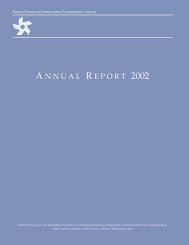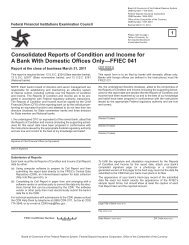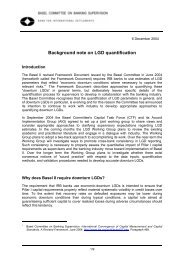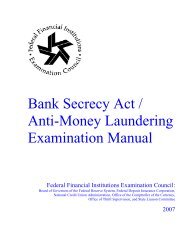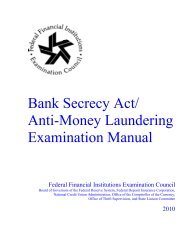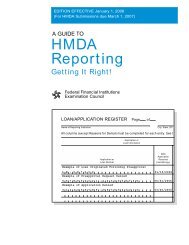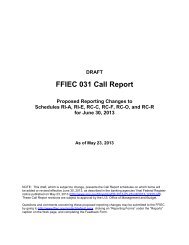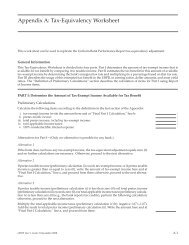FFIEC Annual Report 1999
FFIEC Annual Report 1999
FFIEC Annual Report 1999
You also want an ePaper? Increase the reach of your titles
YUMPU automatically turns print PDFs into web optimized ePapers that Google loves.
as Chief Financial Officer and<br />
oversees the OCC’s Equal<br />
Employment programs.<br />
The Ombudsman’s office oversees<br />
the national bank appeals<br />
process. The office resolves individual<br />
appeals from national<br />
banks and acts as a liaison between<br />
the OCC and anyone with<br />
unresolved problems in dealing<br />
with the OCC regarding its regulatory<br />
activities. The Ombudsman<br />
also oversees the Customer Assistance<br />
Group, a centralized function<br />
that handles all customer<br />
complaints.<br />
The OCC’s six geographic districts<br />
are headquartered in New York,<br />
(N.Y.); Atlanta, (Ga.); Chicago, (Ill.);<br />
Kansas City, (Mo.); Dallas, (Tex.);<br />
and San Francisco, (Calif.). The<br />
agency is funded through assessments<br />
on the assets of national<br />
banks.<br />
Office of Thrift Supervision<br />
(OTS)<br />
The OTS was established as a<br />
bureau of the Treasury Department<br />
on August 9, 1989. OTS has the authority<br />
to charter federal thrift institutions.<br />
It is the primary regulator of<br />
all federal and many state-chartered<br />
thrifts.<br />
The mission of the OTS is to<br />
effectively and efficiently supervise<br />
thrift institutions<br />
maintain the safety and soundness<br />
and viability of the industry<br />
encourage a competitive industry<br />
to meet America’s housing, community<br />
credit, and financial<br />
services needs and to provide<br />
access to financial services for all<br />
Americans.<br />
OTS carries out its mission by (1)<br />
adopting regulations governing the<br />
thrift industry, (2) examining and<br />
supervising thrift institutions and<br />
their affiliates, (3) taking appropriate<br />
action to enforce compliance<br />
with federal laws and regulations,<br />
26<br />
and (4) acting on applications to<br />
charter or acquire a savings association.<br />
Besides overseeing the<br />
thrift institutions themselves, OTS<br />
also has the authority to regulate,<br />
examine, and supervise companies<br />
that own thrifts and controls the<br />
acquisitions of thrifts by such holding<br />
companies.<br />
OTS is headed by a Director<br />
appointed by the President, with<br />
the advice and consent of the Senate,<br />
to serve a five-year term. The<br />
Director determines policy for the<br />
OTS and makes final decisions on<br />
regulations governing the industry<br />
as a whole and on measures affecting<br />
individual institutions. The<br />
Director also serves as a member<br />
of the board of the FDIC and the<br />
NRC. The Office of the Director<br />
also includes the Office of Equality<br />
and Workplace Principles, the<br />
Ombudsman, and liaison with the<br />
FDIC.<br />
The Deputy Director of OTS assists<br />
the Director in managing various<br />
agency programs with an emphasis<br />
on regulatory issues. In particular,<br />
the Deputy Director oversees<br />
OTS’s five regional offices, the<br />
Office of Supervision and Examinations,<br />
and the Office of<br />
Compliance Policy and Specialty<br />
Examinations. Major responsibilities<br />
of these offices include the<br />
supervision and examination of<br />
OTS-regulated thrifts to ensure<br />
safety and soundness of the<br />
industry, compliance with consumer<br />
protection, Community<br />
Reinvestment Act and fair lending<br />
requirements, the development<br />
of policies affecting those functions,<br />
applications of all types,<br />
and the agency’s accounting<br />
policies. The Deputy Director<br />
also oversees the Office of<br />
Information Systems, which<br />
manages the agency’s information<br />
systems, and the agency’s<br />
financial management, human<br />
resources, training and procurement<br />
programs.<br />
The other major functions of OTS<br />
are<br />
the Chief Counsel, who oversees<br />
the legal activities of the agency.<br />
This responsibility includes representing<br />
OTS on pending litigation;<br />
preparing the record for<br />
final agency action in accordance<br />
with legal requirements; pursuing<br />
enforcement actions relating to<br />
thrift institutions; providing<br />
legal advice and opinions; and<br />
drafting support on regulatory<br />
projects, statutes, and regulations.<br />
the Research and Analysis office,<br />
which is composed of four units:<br />
Risk Management, Economic<br />
Analysis, Industry Analysis, and<br />
Financial <strong>Report</strong>ing. The office<br />
develops and maintains surveillance<br />
systems for monitoring and<br />
reporting the condition of the<br />
thrift industry and assists in identifying<br />
the impact of emerging<br />
issues. The office also collects<br />
data, analyzes trends, and reports<br />
on the exposure of individual<br />
institutions to interest-rate risk.<br />
This information is used by the<br />
institution’s management and<br />
OTS examiners.<br />
the External Affairs function,<br />
which manages congressional<br />
matters and press relations. It<br />
interacts with members of the<br />
Congress as well as with executives<br />
of other federal agencies to<br />
accomplish the legislative and<br />
regulatory objectives of the OTS.<br />
The office convenes press conferences;<br />
distributes news releases;<br />
and communicates and explains<br />
policy directives, objectives, and<br />
actions of the agency to the Congress,<br />
the press, the thrift industry,<br />
other government agencies,<br />
and employees.<br />
The OTS’s five geographic regional<br />
offices are located in Jersey City,<br />
(N.J.); Atlanta, (Ga.); Chicago, (Ill.);<br />
Dallas, (Tex.); and San Francisco,<br />
(Calif.).<br />
The OTS uses no tax money to fund<br />
its operations. Its expenses are<br />
funded through fees and assessments<br />
levied on the institutions it<br />
regulates.





